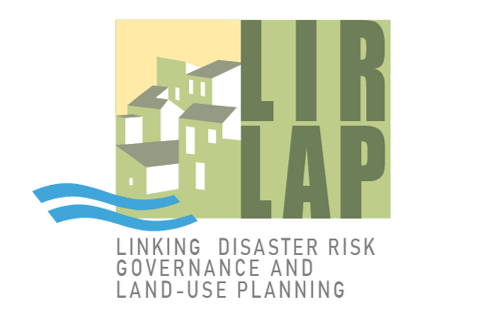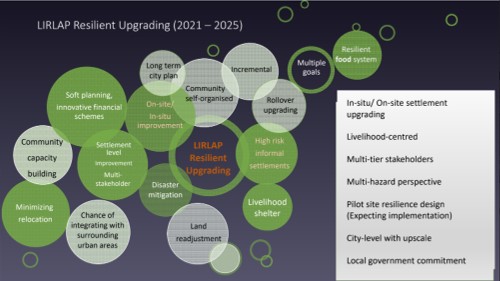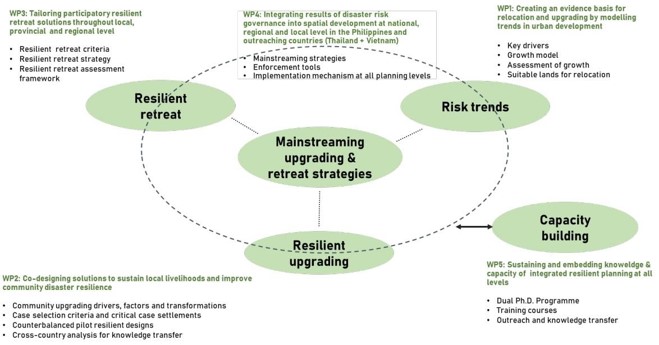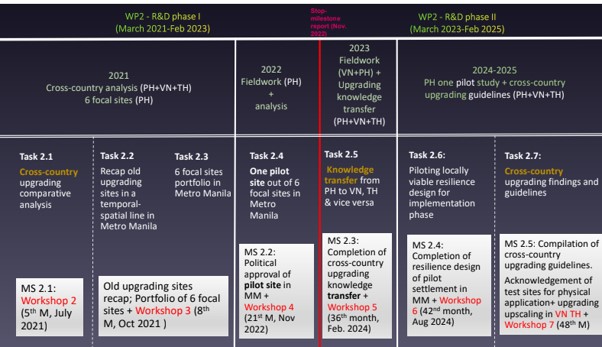urban resilience
year 2021

Linking Disaster Risk Governance and Land-use Planning: The Case of Informal Settlements in Hazard Prone Areas in the Philippines, Thailand and Vietnam (LIRLAP). Part of the research program Sustainable Development of Urban Regions (SURE) funded by German Federal Ministry of Education and Research (BMBF)
āļāļēāļĢāđāļāļ·āđāļāļĄāđāļĒāļāļāļēāļĢāļāļāļāļĢāļāļāđāļāļ·āđāļāļĢāļāļāļĢāļąāļāļ āļąāļĒāļāļīāļāļąāļāļīāļāļąāļāļāļēāļĢāļ§āļēāļāđāļāļāļāļēāļĢāđāļāđāļāļĢāļ°āđāļĒāļāļāđāļāļĩāđāļāļīāļ: āļāļĢāļāļĩāļĻāļķāļāļĐāļēāļāļēāļĢāļāļąāđāļāļāļīāđāļāļāļēāļāļāļāļāļĢāļ°āļāļāđāļāļāļ·āđāļāļāļĩāđāđāļŠāļĩāđāļĒāļāļ āļąāļĒāļāļāļāļāļĢāļ°āđāļāļĻāļāļīāļĨāļīāļāļāļīāļāļŠāđ āđāļ§āļĩāļĒāļāļāļēāļĄ āļāļĢāļ°āđāļāļĻāđāļāļĒ āļŦāļĢāļ·āļ LIRLAP āđāļāđāļāļŦāļāļķāđāļāđāļāđāļāļĢāļāļāļēāļĢāļ§āļīāļāļąāļĒāļ āļēāļĒāđāļāđāļāļļāļāđāļāļĢāļāļāļēāļĢāļ§āļīāļāļąāļĒ Sustainable Development of Urban Regions (SURE) āļāļāļāļāļĢāļ°āļāļĢāļ§āļāļĻāļķāļāļĐāļēāļāļīāļāļēāļĢāđāļĒāļāļĢāļĄāļāļĩ German Federal Ministry of Education and Research (BMBF)

(āļŠāļģāļŦāļĢāļąāļāļ āļēāļĐāļēāđāļāļĒ āļāļĢāļļāļāļēāđāļĨāļ·āđāļāļāļĨāļ)
Linking Disaster Risk Governance and Land-use Planning: The Case of Informal Settlements in Hazard Prone Areas in the Philippines, Thailand and Vietnam (LIRLAP). LIRLAP is a part of the Sustainable Development of Urban Regions (SURE) research programm funded by German Federal Ministry of Education and Research (BMBF) from 2021-2025.
LIRLAP is co-producing climate-adapted upgrading and retreat schemes with inhabitants to elevate livelihoods, mainstreaming locally viable strategies for upgrading and retreat and integrating resilience planning.
LIRLAP focuses on informal settlements and mitigates the risk for residents to bear the consequences of environmental disasters. LIRLAP endeavours climate adaptive
enhancement and resettlement programmes together with the local residents in order to improve their livelihoods. Locally viable strategies for upgrading and resettlement are integrated into resilience planning. LIRLAP project focuses on three objectives.
(1) Urban development approaches for resettlement and upgrading will be developed based on pilot projects.
(2) Climate adaptive evaluation and resettlement approaches will be co-produced with local residents to improve their livelihoods.
(3) LIRLAP plans to mainstream locally sustainable upgrading and resettlement strategies and to integrate resilient planning through training programs and dual doctorates between Dortmund and the School of Urban and Regional Planning -University of the Philippines.
LIRLAP has developed six work packages for the capital Research and Development phase (3/2021 - 2/2025), which were assigned to technical expertise according to the LIRLAP cooperation partners. All WPs are carried out in close cooperation in real laboratory formats with the local partner SURP (School of Urban and Regional Planning, University of the Philippines) - as the central scientific institution in the Philippines in the field of urban, regional and environmental planning and a long-term cooperation partner.

WP1: Creating an evidence basis for relocation and upgrading by modelling trends in urban development. Objectives: o Model refinement with urban morphology and socio-economic scenarios o Model risk trends under different resettlement or in-situ upgrading options o Transfer of the risk trend model to partner cities in Thailand and Vietnam o Integration and validation of risk trends across different scenario frameworks
WP2: CO-designing solution to sustain local livelihoods and improve community disaster resilience. Objectives: o Working with multi-tier stakeholders in addressing a scientific approach for resilient upgrading of high-risk informal settlements in communities within Metro Manila. o Emphasizing in-situ/on-site improvement of informal settlements. On-site resilient upgrading seeks to maximize development on the lands, where the communities are located, taking the given relatedness of the people to their land into account, and minimize relocation and displacement. o Enhancing disaster resilience, improvement of the overall living and health conditions and capacity building of informal settlement communities to sustain their livelihoods and empowering participation in project implementation and policy design.
WP3: Tailoring participatory resilient retreat solution throughout local, provincial and regional. Objective: to incorporate and apply the monitoring framework (output of definition phase) in practice and to provide resilient solutions for retreat by developing concrete model-projects with relevant stakeholders. Accordingly, a household survey is implemented to evaluate (further: initiate a framework for monitoring) the impacts of different approaches (based on the developed typology) of resettlement in Metro Manila. Subsequently, best practice examples or model-retreat projects are developed in a gaming simulation. Henceforth, the model-projects need to go through a multi-stage process by investigating the planning phase, the transition phase as well as the potential phases of development and incorporation. Based on provided data on suitable land by the urban growth model, one or two concrete resettlement sites will be developed that reflect the best resilience and likewise cost-benefit prospect. The research in Metro Manila is framed by a cross-country analysis and a compilation that consult cases and experiences in the partner countries Thailand and Vietnam. An achievement will be a retreat guideline that draws on the intensive fieldwork and reflects various conditions and approaches of the Southeast Asian countries.
WP4: Integrating results of disaster risk governance into spatial development at national, regional and local level in the Philippines and outreaching countries (Thailand and Vietnam) Objectives: to develops and formalize the LIRLAP approach into a user-friendly, coherent conceptual framework, methodology and practical mechanism. o To support evidence-based progression from modelling risk to decisions about choices of strategy, particularly in relation to retreat and upgrading. o To help users to identify opportunities and limitations more clearly to mainstreaming the approach across sectors, scales and their different planning horizons, requiring them to identify sectoral silos and governance gaps and develop plans to address these.
WP5: Capacity building Objectives: To introduce the learners on the different aspects of community resiliency and how it can be integrated in urban shelter planning and management. Collaboration with partners in Vietnam and Thailand. o Learn about the concepts and principles of community resiliency and urban shelter planning and management. o Understand the approaches and practices of integrating community resiliency in urban shelter plans. o Develop a resilient urban shelter plan that incorporates cross-cutting and multi-disciplinary targets and strategies
WP 6: Project coordination and management

(āļāļāļąāļāļ āļēāļĐāļēāđāļāļĒ)
LIRLAP āļāļĩāđ āļāļ°āđāļāđāļāļāļģāļāļīāļāļāļĢāļĢāļĄāļāļĩāđāđāļāļĩāđāļĒāļ§āļāđāļāļāļāļąāļāļāļēāļĢāļĒāļāļĢāļ°āļāļąāļāļāļĩāđāļāļĒāļđāđāļāļēāļĻāļąāļĒāļāļāļāļāļđāđāļĄāļĩāļĢāļēāļĒāđāļāđāļāđāļāļĒāđāļāđāļĄāļ·āļāļāļāļąāļāđāļāļ·āđāļāļāļĄāļēāļāļēāļāļāļĨāļāļĢāļ°āļāļāļāļĩāđāļāļ°āđāļāļīāļāļāļķāđāļāļāļēāļĢāđāļāļĨāļĩāđāļĒāļāđāļāļĨāļāļŠāļ āļēāļāļ āļđāļĄāļīāļāļēāļāļēāļĻ āđāļāđāļ āļāđāļģāļāđāļ§āļĄāđāļĨāļ°āļāđāļģāđāļĨāđāļ āđāļāļĒāļāļ°āļĄāļĩāļāļđāđāđāļāļĩāđāļĒāļ§āļāļēāļāļāđāļēāļāļāļēāļĢāđāļāļĨāļĩāđāļĒāļāđāļāļĨāļāļŠāļ āļēāļāļ āļđāļĄāļīāļāļēāļāļēāļĻāđāļĨāļ°āļāļēāļĢāļ§āļēāļāđāļāļāđāļĄāļ·āļāļāļāļēāļāļŠāļŦāļāļąāļāļāđāļŠāļēāļāļēāļĢāļāļĢāļąāļāđāļĒāļāļĢāļĄāļāļĩ āļāļīāļĨāļīāļāļāļīāļāļŠāđ āđāļĨāļ°āđāļ§āļĩāļĒāļāļāļēāļĄ āđāļāļāļēāļĢāđāļĨāļāđāļāļĨāļĩāđāļĒāļāđāļĨāļ°āđāļĢāļĩāļĒāļāļĢāļđāđāđāļāļ·āđāļāļĻāļķāļāļĐāļēāđāļāļĢāļĩāļĒāļāđāļāļĩāļĒāļāļĢāļ°āļŦāļ§āđāļēāļāļāļĢāļ°āđāļāļĻ āđāļĨāļ°āļāļģāļŠāļđāđāļāđāļāđāļŠāļāļāļāļēāļāļ§āļīāļāļēāļāļēāļĢāđāļāļ·āđāļāļāļģāđāļāļāļĢāļąāļāđāļāđāđāļāļāļēāļĢāļ§āļēāļāđāļāļāļāļąāļāļāļēāđāļĄāļ·āļāļāđāļĨāļ°āļāļēāļĢāļĒāļāļĢāļ°āļāļąāļāļāļĩāđāļāļĒāļđāđāļāļēāļĻāļąāļĒāļāļāļāļāļđāđāļĄāļĩāļĢāļēāļĒāđāļāđāļāđāļāļĒāđāļāđāļĄāļ·āļāļāļāļąāđāļ 4 āļāļĢāļ°āđāļāļĻāļāđāļāđāļ āđāļāļĒāļāļ°āļāļģāļāļēāļĢāļĻāļķāļāļĐāļēāļāļĩāđāđāļĄāļ·āļāļāļŦāļĨāļ§āļāļāļāļāđāļāđāļāļĩāļĒāļāļ°āļ§āļąāļāļāļāļāđāļāļĩāļĒāļāđāļāđ āļāļ·āļ āļĄāļ°āļāļīāļĨāļē āļŪāļēāļāļāļĒ āđāļĨāļ°āļāļĢāļļāļāđāļāļāļĄāļŦāļēāļāļāļĢāđāļĨāļ°āļāļĢāļīāļĄāļāļāļĨ
āļ§āļąāļāļāļļāļāļĢāļ°āļŠāļāļāđ:
1. āđāļāļ·āđāļāđāļāđāļāļāļēāļĢāļ§āļīāđāļāļĢāļēāļ°āļŦāđāļāļēāļĢāđāļāļĨāļĩāđāļĒāļāđāļāļĨāļāļāļāļāļāļēāļĢāđāļāđāļāļĢāļ°āđāļĒāļāļāđāļāļĩāđāļāļīāļ āđāļĨāļ°āļāļ§āļēāļĄāđāļŠāļĩāđāļĒāļāļāđāļēāļāđ āļāļ°āļŠāđāļāļāļĨāļāļĢāļ°āļāļāļāđāļāļāļēāļĢāđāļāļĢāļīāļāđāļāļīāļāđāļāļāļāļāđāļĄāļ·āļāļāđāļĨāļ°āļāļēāļĢāļāļąāđāļāļāļīāđāļāļāļēāļāļāļāļāļāļļāļĄāļāļ
2. āđāļāļ·āđāļāļ§āļēāļāđāļāļāļāļēāļĢāđāļāđāļāļĢāļ°āđāļĒāļāļāđāļāļĩāđāļāļīāļāļŠāļģāļŦāļĢāļąāļāļāļēāļĢāļāļąāđāļāļāļīāđāļāļāļēāļāļāļāļāļāļĨāļļāđāļĄ āļāļļāļĄāļāļāļāļĩāđāļĄāļĩāļāļ§āļēāļĄāļŦāļāļēāđāļāđāļāļŠāļđāļ āđāļāļĒāđāļŦāđāļāļ§āļēāļĄāļŠāļģāļāļąāļāļāļąāļāļāļēāļĢāļ§āļēāļāđāļāļāļāļēāļĢāđāļāđāļāļĢāļ°āđāļĒāļāļāđāļāļĩāđāļāļīāļāđāļāļĒāļāļģāļāļķāļāļāļķāļāļāļĢāļ°āđāļāđāļāļ āļąāļĒāļāļīāļāļąāļāļīāļāļąāļāļāļ°āļŠāđāļāļāļĨāļāļąāļāļāļēāļĢāļāļąāđāļāļāļīāđāļāļāļēāļāļāļąāđāļ āļāđāļēāļāđāļāļ§āļāļēāļāļāļēāļĢāļāļĢāļąāļāļāļĢāļļāļāļāļĩāđāļāļĒāļđāđāļāļēāļĻāļąāļĒāđāļŦāđāļĢāļāļāļĢāļąāļāļ āļąāļĒāļāļīāļāļąāļāļīāđāļāđ āļŦāļĢāļ·āļ āļāļēāļĢāļĒāđāļēāļĒāđāļŦāļĨāđāļāļāļĩāđāļāļąāđāļāļāļļāļĄāļāļāđāļāļĒāļąāļāļāļ·āđāļāļāļĩāđāļāļĩāđāļĄāļĩāļāļ§āļēāļĄāļāļĨāļāļāļ āļąāļĒāļāļĒāđāļēāļāļĄāļĩāļŠāđāļ§āļāļĢāđāļ§āļĄāļāđāļēāļāļāļĢāļāļĩāđāļĄāļ·āļāļāļĻāļķāļāļĐāļēāđāļāļāļĢāļ°āđāļāļĻāđāļāļĒ āļāļĢāļ°āđāļāļĻāđāļ§āļĩāļĒāļāļāļēāļĄ āđāļĨāļ°āļāļĢāļ°āđāļāļĻāļāļīāļĨāļīāļāļāļīāļāļŠāđ
3. āđāļāļ·āđāļāļāļģāđāļŠāļāļāđāļāļ§āļāļēāļāđāļĨāļ°āļāļĨāļĒāļļāļāļāđāđāļāļāļēāļĢāļāļģāđāļāļāļĢāļąāļāđāļāđāđāļāļāļēāļĢāļ§āļēāļāđāļāļāļāļēāļĢāđāļāđāļāļĢāļ°āđāļĒāļāļāđāļāļĩāđāļāļīāļāđāļāļ·āđāļ āļāļąāđāļāļāļīāđāļāļāļēāļāļāļĒāđāļēāļāļĄāļĩāļāļ§āļēāļĄāļāļĨāļāļāļ āļąāļĒāđāļĨāļ°āļŠāļēāļĄāļēāļĢāļāļĢāļāļāļĢāļąāļāļāļēāļĢāđāļāļĨāļĩāđāļĒāļāđāļāļĨāļāđāļāđ āļŦāļĢāļ·āļ āļāļēāļĢāļāļąāļāļāļēāđāļĄāļ·āļāļāđāļŦāđāļĄāļĩāļāļ§āļēāļĄāļāļĨāļ§āļąāļ (urban resilience)
4. āđāļāļ·āđāļāļāđāļēāļĒāļāļāļāļāļāļāđāļāļ§āļēāļĄāļĢāļđāđāļāļēāļāļāļēāļĢāļāļģāļ§āļīāļāļąāļĒāđāļĨāļ°āļāļāļāđāļāļ§āļēāļĄāļĢāļđāđāļāđāļēāļāļāļēāļĢāļāļąāļāļāļēāđāļĄāļ·āļāļ Integration of community Resilience in Urban Shelter Planning and Management āđāļĨāļ° Smarter Urban Governance for Settlement Development Planning and Management āļāđāļēāļāļāļēāļĢāļāļāļĢāļĄāļĢāļ°āļĒāļ°āļŠāļąāđāļ āļĢāļ§āļĄāđāļāļāļķāļāļāļēāļĢāļāļąāļāļŦāļĨāļąāļāļŠāļđāļāļĢāļāļēāļĢāđāļĢāļĩāļĒāļāļāļēāļĢāļŠāļāļāđāļāļĢāļđāļāđāđāļāļ Joint PhD
āļĢāļ°āļĒāļ°āđāļ§āļĨāļēāļāļģāđāļāļīāļāđāļāļĢāļāļāļēāļĢāđāļāđāļāļĢāļ°āļĒāļ°āđāļ§āļĨāļē 4 āļāļĩ āļĢāļ°āļŦāļ§āđāļēāļāļāļĩ āļ.āļĻ.2564 â āļ.āļĻ. 2568
Partners
Research Team
Assoc.Prof. Dr. Wijitbusaba Marome (āļĢāļĻ.āļāļĢ. āļ§āļīāļāļīāļāļĢāļāļļāļĐāļāļē āļĄāļēāļĢāļĄāļĒāđ)
Faculty Of Architecture And Planning, Thammasat University
āļāļāļ°āļŠāļāļēāļāļąāļāļĒāļāļĢāļĢāļĄāļĻāļēāļŠāļāļĢāđāđāļĨāļ°āļāļēāļĢāļāļąāļāđāļĄāļ·āļāļ āļĄāļŦāļēāļ§āļīāļāļĒāļēāļĨāļąāļĒāļāļĢāļĢāļĄāļĻāļēāļŠāļāļĢāđ
Asst.Prof. Dr. Boonanan Natakun (āļāļĻ.āļāļĢ. āļāļļāļāļāļāļąāļāļāđ āļāļāļāļļāļĨ)
Faculty Of Architecture And Planning, Thammasat University
āļāļāļ°āļŠāļāļēāļāļąāļāļĒāļāļĢāļĢāļĄāļĻāļēāļŠāļāļĢāđāđāļĨāļ°āļāļēāļĢāļāļąāļāđāļĄāļ·āļāļ āļĄāļŦāļēāļ§āļīāļāļĒāļēāļĨāļąāļĒāļāļĢāļĢāļĄāļĻāļēāļŠāļāļĢāđ
Nontarit Bejrananda (āļāļāļāļēāļāļīāļāļĒāđ āđāļāļāļāļāļąāļāļāđāļāļē)
Faculty Of Architecture And Planning, Thammasat University
āļāļāļ°āļŠāļāļēāļāļąāļāļĒāļāļĢāļĢāļĄāļĻāļēāļŠāļāļĢāđāđāļĨāļ°āļāļēāļĢāļāļąāļāđāļĄāļ·āļāļ āļĄāļŦāļēāļ§āļīāļāļĒāļēāļĨāļąāļĒāļāļĢāļĢāļĄāļĻāļēāļŠāļāļĢāđ
Pimnara Rodkul (āļāļīāļĄāļāļāļĢāļē āļĢāļāļāļāļļāļĨ)
Faculty Of Architecture And Planning, Thammasat University
āļāļāļ°āļŠāļāļēāļāļąāļāļĒāļāļĢāļĢāļĄāļĻāļēāļŠāļāļĢāđāđāļĨāļ°āļāļēāļĢāļāļąāļāđāļĄāļ·āļāļ āļĄāļŦāļēāļ§āļīāļāļĒāļēāļĨāļąāļĒāļāļĢāļĢāļĄāļĻāļēāļŠāļāļĢāđ
